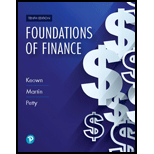
Foundations Of Finance
10th Edition
ISBN: 9780134897264
Author: KEOWN, Arthur J., Martin, John D., PETTY, J. William
Publisher: Pearson,
expand_more
expand_more
format_list_bulleted
Textbook Question
Chapter 7, Problem 7SP
(Bond relationship) Mason, Inc. has two bond issues outstanding, called Series A and Series B both paying the same annual interest of $55. Series A has a maturity of 12 years, whereas Series B has a maturity of 1 year.
- a. What would be the value of each of these bonds when the going interest rate is (1) 4 percent, (2) 7 percent, and (3) 10 percent? Assume that there is only one more interest payment to be made on the Series B bonds.
- b. Why does the longer-term (12-year) bond fluctuate more when interest rates change than does the shorter-term (1-year) bond?
Expert Solution & Answer
Want to see the full answer?
Check out a sample textbook solution
Students have asked these similar questions
What is the difference between alpha and beta in investment analysis? Need help
What is a derivative, and how is it used for hedging? Need help
Explain the Capital Asset Pricing Model (CAPM). What does each component represent in Finance ?
Chapter 7 Solutions
Foundations Of Finance
Ch. 7 - Prob. 1RQCh. 7 - Prob. 2RQCh. 7 - Prob. 3RQCh. 7 - a. How does a bonds par value differ from its...Ch. 7 - Prob. 5RQCh. 7 - Prob. 6RQCh. 7 - Prob. 7RQCh. 7 - Prob. 8RQCh. 7 - Prob. 9RQCh. 7 - Define the expected rate of return to bondholders.
Ch. 7 - (Bond valuation) Bellingham bonds have an annual...Ch. 7 - (Bond valuation) Flora Co.s bonds, maturing in 7...Ch. 7 - (Bond valuation) You own a 20-year, 1,000 par...Ch. 7 - (Bond valuation) Calculate the value of a bond...Ch. 7 - (Bond valuation) At the beginning of the year, you...Ch. 7 - Prob. 6SPCh. 7 - (Bond relationship) Mason, Inc. has two bond...Ch. 7 - Prob. 8SPCh. 7 - (Bond valuation) National Steels 15-year, 1,000...Ch. 7 - (Bond valuation) You own a bond that pays 70 in...Ch. 7 - Prob. 11SPCh. 7 - (Bond valuationzero coupon) The Latham Corporation...Ch. 7 - (Bond valuation) Bank of America has bonds that...Ch. 7 - Prob. 15SPCh. 7 - Prob. 16SPCh. 7 - Prob. 17SPCh. 7 - (Bondholders expected rate of return) You own a...Ch. 7 - (Expected rate of return and current yield) Time...Ch. 7 - (Expected rate of return and current yield)...Ch. 7 - Prob. 21SPCh. 7 - Prob. 22SPCh. 7 - (Current yield) Assume you have a bond with a...Ch. 7 - Prob. 24SPCh. 7 - (Expected rate of return) Assume you own a bond...Ch. 7 - Prob. 26SPCh. 7 - (Bondholders expected rate of return) You...Ch. 7 - Prob. 1MCCh. 7 - Assume that the bonds are selling for the...Ch. 7 - Prob. 3MCCh. 7 - Prob. 4MCCh. 7 - Prob. 5MC
Knowledge Booster
Learn more about
Need a deep-dive on the concept behind this application? Look no further. Learn more about this topic, finance and related others by exploring similar questions and additional content below.Similar questions
- What is the 4% rule in retirement planning in finance?arrow_forward(Calculating NPV) Carson Trucking is considering whether to expand its regional service center in Moab, Utah. The expansion will require the expenditure of $10,000,000 on new service equipment and will generate annual net cash inflows from reduced costs of operations equal to $2,500,000 per year for each of the next 8 years. In year 8, the firm will also get back a cash flow equal to the salvage value of the equipment, which is valued at $1 million. Thus, in year 8, the investment cash inflow will total $3,500,000. Calculate the project's NPV using a discount rate of 9 percent. If the discount rate is 9 percent, then the project's NPV is (round your answer to the nearest dollar) Sarrow_forward(Calculating annuity payments) The Aggarwal Corporation needs to save $7 million to retire a(n) $7 million mortgage that matures in 17 years. To retire this mortgage, the company plans to put a fixed amount into an account at the end of each year for 17 years. The Aggarwal Corporation expects to earn 13 percent annually on the money in this account. What equal annual contribution must the firm make to this account to accumulate the $7 million by the end of 17 years? The equal annual contribution Aggarwal must make to this account is (round your answer to the nearest cent) $.arrow_forward
arrow_back_ios
SEE MORE QUESTIONS
arrow_forward_ios
Recommended textbooks for you
 Essentials Of InvestmentsFinanceISBN:9781260013924Author:Bodie, Zvi, Kane, Alex, MARCUS, Alan J.Publisher:Mcgraw-hill Education,
Essentials Of InvestmentsFinanceISBN:9781260013924Author:Bodie, Zvi, Kane, Alex, MARCUS, Alan J.Publisher:Mcgraw-hill Education,

 Foundations Of FinanceFinanceISBN:9780134897264Author:KEOWN, Arthur J., Martin, John D., PETTY, J. WilliamPublisher:Pearson,
Foundations Of FinanceFinanceISBN:9780134897264Author:KEOWN, Arthur J., Martin, John D., PETTY, J. WilliamPublisher:Pearson, Fundamentals of Financial Management (MindTap Cou...FinanceISBN:9781337395250Author:Eugene F. Brigham, Joel F. HoustonPublisher:Cengage Learning
Fundamentals of Financial Management (MindTap Cou...FinanceISBN:9781337395250Author:Eugene F. Brigham, Joel F. HoustonPublisher:Cengage Learning Corporate Finance (The Mcgraw-hill/Irwin Series i...FinanceISBN:9780077861759Author:Stephen A. Ross Franco Modigliani Professor of Financial Economics Professor, Randolph W Westerfield Robert R. Dockson Deans Chair in Bus. Admin., Jeffrey Jaffe, Bradford D Jordan ProfessorPublisher:McGraw-Hill Education
Corporate Finance (The Mcgraw-hill/Irwin Series i...FinanceISBN:9780077861759Author:Stephen A. Ross Franco Modigliani Professor of Financial Economics Professor, Randolph W Westerfield Robert R. Dockson Deans Chair in Bus. Admin., Jeffrey Jaffe, Bradford D Jordan ProfessorPublisher:McGraw-Hill Education

Essentials Of Investments
Finance
ISBN:9781260013924
Author:Bodie, Zvi, Kane, Alex, MARCUS, Alan J.
Publisher:Mcgraw-hill Education,



Foundations Of Finance
Finance
ISBN:9780134897264
Author:KEOWN, Arthur J., Martin, John D., PETTY, J. William
Publisher:Pearson,

Fundamentals of Financial Management (MindTap Cou...
Finance
ISBN:9781337395250
Author:Eugene F. Brigham, Joel F. Houston
Publisher:Cengage Learning

Corporate Finance (The Mcgraw-hill/Irwin Series i...
Finance
ISBN:9780077861759
Author:Stephen A. Ross Franco Modigliani Professor of Financial Economics Professor, Randolph W Westerfield Robert R. Dockson Deans Chair in Bus. Admin., Jeffrey Jaffe, Bradford D Jordan Professor
Publisher:McGraw-Hill Education
Risk and return of individual securities; Author: BMOCommunity;https://www.youtube.com/watch?v=ubiUxiTgIfw;License: Standard youtube license